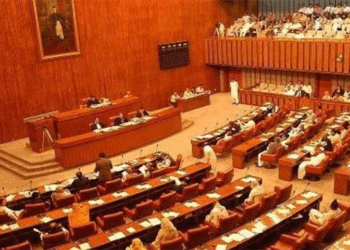By Khizer Ahmed Khan
In the heart of Islamabad, the 2024 SCO summit unfolded, a pivotal stage for Pakistan to showcase its regional leadership and attract investment. However, the event was overshadowed by the looming shadow of the US-China rivalry, forcing Pakistan to navigate a delicate balancing act between these two global giants.
The SCO, a platform for regional cooperation, offered Pakistan an opportunity to bolster its standing and promote initiatives like the Regional Anti-Terrorism Structure (RATS) and the SCO Energy Club. Yet, the summit’s focus was also on CPEC, a massive infrastructure project funded by China. While CPEC promised economic growth, it also raised concerns about Pakistan’s debt burden and economic sovereignty.
As Pakistan grappled with these challenges, the IMF bailout package loomed large. The Chinese delegation’s presence at the summit provided some diplomatic cover, but the IMF’s decision ultimately depended on Pakistan’s domestic economic policies.
The summit highlighted Pakistan’s aspiration to be a regional leader, but the road ahead was fraught with challenges. Balancing the demands of the US and China, managing the debt burden associated with CPEC, and addressing the IMF’s concerns were just a few of the hurdles Pakistan faced.
To succeed, Pakistan needed to promote transparency in CPEC projects, diversify its economic partnerships, and foster strategic alliances with other regional powers. The SCO summit was a significant step, but the true test would be Pakistan’s ability to leverage the opportunities presented while navigating the diplomatic challenges and ensuring sustainable economic development.
The Geopolitical Context
The SCO summit took place amidst a backdrop of heightened geopolitical tensions between the US and China. The two superpowers were engaged in a fierce competition for global influence, with the SCO emerging as a key battleground. Pakistan, as a member of both the SCO and the US-led Western alliance, found itself caught in the crossfire.
The US, concerned about China’s growing economic and military power, sought to counter its influence in the region. The US administration applied pressure on Pakistan to distance itself from China and align more closely with US interests. However, Pakistan’s deep-rooted relationship with China made it difficult to completely break free from Chinese influence.
The Economic Implications of CPEC
CPEC, a centerpiece of the SCO summit, offered significant economic opportunities for Pakistan. The project promised to boost infrastructure development, create jobs, and enhance regional connectivity. However, it also raised concerns about Pakistan’s debt burden and economic sovereignty.
Pakistan financed CPEC projects primarily through Chinese loans, which significantly increased its foreign debt. Critics argued that Pakistan may struggle to repay these loans, particularly if the economic benefits of CPEC did not materialize as expected. Additionally, some expressed concerns that CPEC could exacerbate economic inequality in Pakistan, as the benefits of the project may disproportionately accrue to elite groups and regions.
The IMF Bailout Package
The IMF bailout package was a pressing issue for Pakistan at the time of the SCO summit. The IMF imposed strict conditions on Pakistan, including fiscal austerity measures and reforms to the energy sector. The Chinese delegation’s presence at the summit provided some diplomatic cover for Pakistan, but it did not exempt the country from the IMF’s demands.
Pakistan’s negotiations with the IMF were fraught with challenges. The IMF required Pakistan to implement difficult reforms, which could have negative social and economic consequences. However, the bailout package was essential for Pakistan to avoid a debt default and stabilize its economy.
The Way Forward
The SCO summit highlighted Pakistan’s desire to be a regional leader. However, the road ahead was fraught with challenges. To succeed, Pakistan needed to:
- Promote transparency in CPEC projects: By providing clear information about the costs, benefits, and risks associated with CPEC projects, Pakistan could build trust with domestic and international stakeholders.
- Diversify its economic partnerships: Pakistan should seek to reduce its reliance on China and the US by diversifying its economic partnerships with other countries in the region and beyond.
- Foster strategic alliances: Building stronger alliances with other SCO members and other regional powers can help Pakistan enhance its bargaining power and influence.
- Address domestic challenges: Pakistan needs to implement reforms to improve its governance, reduce corruption, and enhance its economic competitiveness.
The SCO summit was a significant step for Pakistan, but the true test would be Pakistan’s ability to leverage the opportunities presented while navigating the diplomatic challenges and ensuring sustainable economic development.








